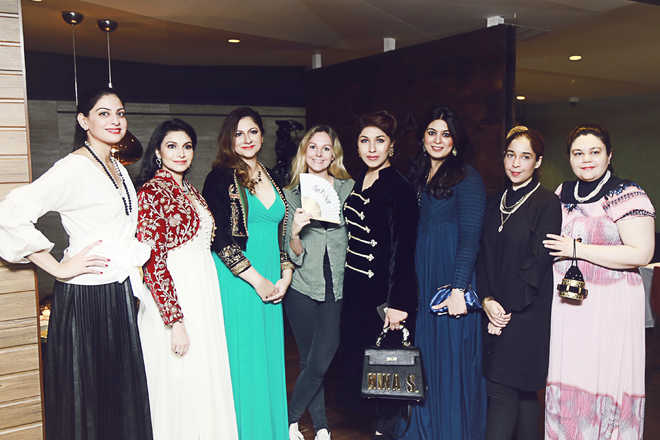
An English World: (L-R) Dr Fatima Chaudhry, Mahlia Lone, Laaleen Sukhera, Olivia Lang of the BBC, Hina Salman, Khadija Malik, Afshan Shafi, Aeyesha Gulzar are members of the JASP
Faiqa Mansab
One does not usually expect Pakistani women to dress up in Regency style and have tea parties, discussing, not just Jane Austen, but how her themes are still so relevant and prevalent in present-day Pakistan. It is more common to see them dressing up in the current trend and enjoy afternoon tea. The Jane Austen Society of Pakistan (JASP) is a band of women who share love for Austen, a sense of humour and chutzpah.
Communication consultant and co-founder of JASP, Laaleen Sukhera says, “Austenistan [an Austen-inspired anthology edited by Sukhera] is a natural outcome of JASP. We were just discussing how much we all love Austen and how relevant the themes still are and we came up with the idea of the book.”
As in India, in Pakistan too, marriage is still the most important event in a girl’s life, even if she is the CEO of a company. Mothers, under pressure to marry off their girls to the ‘most eligible’ bachelors, are swarming at every social gathering. That phrase ‘eligible bachelor’ translates to, as it did in Austen’s world, someone rich. Money is very much at the heart of both Jane Austen’s novels and the Pakistani society. So, when Austenistan, rooted in Pakistan as the name suggests, came out, it touched many a heart and ruffled many a feather. No beards and burqas in sight here, you see.
Mahlia Lone, a JASP member, and the editor of two magazines, says, “At the heart of JASP lies the love for reading and writing. We’ve received a lot of flak from a segment of Pakistani society, but, frankly, I don’t care.”
The irony is that critics who question privilege and class in Pakistan are also the ones using the language of the privileged class, English, and talking about promoting Urdu and regional languages. These dichotomies and ironies of Austen’s world abound in Pakistan and some have the good humour to laugh at that. But who gave women permission to laugh at men, or the society that they make for us? Laughter connotes criticism, and a sense of selfhood independent of received notions that patriarchal structures design for docile women. Austen doesn’t believe in docile women and neither do most women.
Some people have criticised JASP and the stories for being about a ‘privileged’ class. JASP’s well wishers feel reading and writing by women is still seen as a threat to some. These women are considered ‘intellectual’, ‘feminist’ and ‘liberal’, and all of these epithets are considered suspect. Mina Malik-Hussain, a column writer for Nation, adds, “Reading still seems to be the province of unfashionable, desi women and we are very pleased to be so.”
Emma Wodehouse, after all, was a privileged young woman and had some strong opinions, like some of the JASP members. What Austen writes about, the interconnectedness and subtle differences of class and how money plays the key role in marking these boundaries, is very much still a reality in Pakistan.
Gayathri Warnasuriya, who works on science and innovation partnerships in Amman, says, “The humour and wit in Austen, her focus on the lives and loves of women, the fact that she created some of the most engaging heroines in English literature is what attracts readers still.” For its members, JASP embodies all that.
When asked what drew her to JASP, Mehr F. Hussain, a freelance writer, says, “Books, tea and sisterhood! It’s hard being a woman and its even more difficult if you happen to be a bookworm like me. JASP gave the opportunity to connect with like-minded women, foster friendships and discuss Jane Austen.”
Continuing the discussion, Mina Malik-Hussain, says, “Austen is a wry, observant utterly female voice that has taken the interiority of the female experience and given it the interest and pique it deserves.”
Writers who are women, who write about women and social evils concerning them, and manage to do it with humour, insight and fearlessness, are creating a literature of their own in the subcontinent. It’s a growing sisterhood. In 2017 alone, at least 10 new women from Pakistan have been published. These women are not just writing literary fiction, but fantasy, YA, thrillers and romance. Their readership though small, is dedicated and loyal, because they are mostly women and men who are sick of gender stereotypes and are looking towards a newer version of Pakistan where toxic masculinity is replaced by a more tolerant people who read and write a body of literature that reflects problems with humour and sympathy.



























